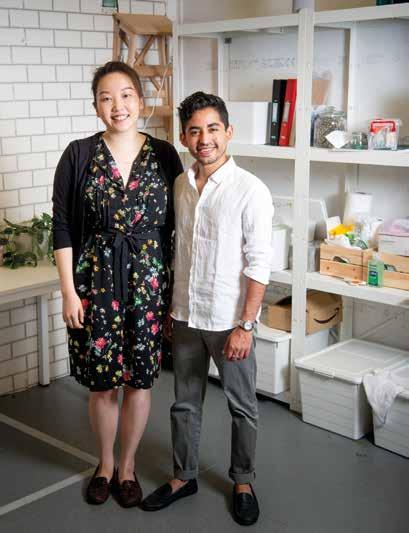
3 minute read
Planera
#InventedAtImperial Planera
Olivia Ahn, CEO
Advertisement
The problem
There is no sustainable route of disposal currently available for sanitary products. In Europe, the pad plastic goes to landfill, incinerators or end up in our waterways, causing huge damage to the environment.
Even if the products are biodegradable, there is no way for them to biodegrade away.
The solution
Planera is the personal hygiene company that is defining the new ‘good enough’. We have developed the first certified flushable and biodegradable sanitary pads. When flushed the pads are designed to disintegrate quickly in existing infrastructure, with a similar environmental impact to toilet paper. Olivia (Liv) and Aaron founded Planera in their penultimate year at Imperial, kickstarted in the WE Innovate programme. After three years of R&D leading to flushability certification, Planera is launching their products to the UK with Liv leading marketing and communication and Aaron heading product development and manufacturing.
Planera has a trusted advisory board with backgrounds in consumer packaged goods (CPG), fastmoving consumer goods (FMCG), digital brands and was venture capital backed in their pre-seed round last year.
How did your team meet?
We were in the same halls in our first year at Imperial. We then lived together during our final year, and (Bachelor of Medicine, Bachelor of Surgery (MBBS), BSc Respiratory 2017)
Aaron Koshy, COO
(BEng Biomedical Engineering, MA/MSc. Engineering 2017)
Previously known as Polipop, WE Innovate 2016 winners Planera have developed the first certified flushable and biodegradable sanitary pads that dissolve quickly in water.
daily 535 tonnes of sanitary
The team
Innovation Design
How Imperial has supported the team
2016 WE Innovate 2016 Experts-in-Residence 2017 IVMS 2017 Imperial College Advanced Hackspace Grant
Get in touch:
Website:
www.planera.care
Twitter:
@planeracare
Instagram:
@planeracare
a confusing conversation brought to light the complexity and issues around periods!
Do you have any advisers?
In WE Innovate, we met with Janet and Eleanor, advisers through the Enterprise Lab. Their clarity and focus has helped us overcome multiple obstacles since our beginning. Not only has their business expertise been invaluable to us, we have also benefitted from them cheering us on from the start.
Deepali Nangia, who we initially met through the IVMS scheme, has joined our advisory board, along with Adrienne Rivlin. We have informal advisers from consumer brands as well as FMCGs, to help us launch Planera and scale.
Enterprise Lab support
For the past two years the Enterprise Lab have been invaluable. Not only was WE Innovate pivotal to us taking the leap and pursuing Planera full time, there has also been continual, sincere support through invitations to forums, such as WE Health in Stockholm, the Turin School of Entrepreneurship and Innovation conference, and the World Economic Forum conference in China. This support is fantastic for networking and learning about other startups in similar fields.
As we both have come from backgrounds not rooted in entrepreneurship, this support has been key in learning on the job as well as providing us with publicity – such as articles when we won the Mayor’s Entrepreneur competition 2018. Having support from Imperial Enterprise Lab is crucial in lending a young startup credibility, especially for going up against giants in the market, such as P&G.
moving forward?
We soft launched Planera this September and people can sign up for our early access boxes to try our flushable pads.
What’s been your biggest success so far?
Our biggest success so far has been getting UK flushability certification. This has been a great validation of our technology and this triggers an exciting phase for Planera, as we set to soft launch in the UK this year.
What’s been the biggest challenge?
There have been a few setbacks along the way. We made the same mistake that other companies have fallen into – we focused on developing a biodegradable pad – so we were just substituting materials of conventional pads, instead of finding a sustainable disposal route. So our first prototypes were biodegradable, but the consumer would have no way of getting it to degrade away, as they would have to bin it, sending it to landfill or incinerator.
What advice would you give to aspiring entrepreneurs?
Always validate. It is time-consuming and can be disheartening but we found that not waiting until ‘perfect’ before validating with anyone (market audience, online research, google surveys, street surveys) was crucial in developing something that someone will want. We were used to the traditional method of testing and trials from medicine where we would extensively do in-house testing before approaching the public. Turning that thinking on its head for entrepreneurship was a big step in making sure every decision and step was validated with our audience in parallel with internal development.










